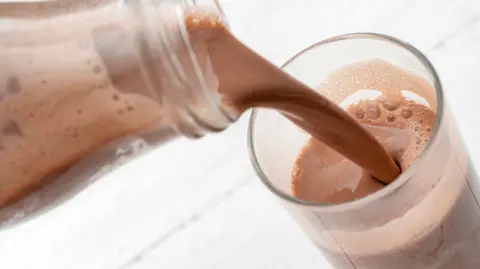Lucy HookerBusiness reporter
 Getty Images
Getty ImagesPre-packaged milkshakes and coffees that are high in sugar will be hit with an extra tax from 2028, after the government said it was extending the tax on fizzy drinks to include milk-based products and lowering the point at which the tax kicks in.
“This government will not look away as children get unhealthier,” Health and Social Care Secretary Wes Streeting said in Parliament.
That could mean an extra tax on popular products like Yazoo, Muller’s Frijj and Starbucks Caffe Latte as well as drinks branded “high protein” like Ufit and Shaken Udder.
The levy, brought in by the Conservative government in 2018, aims to reduce sugar consumption by giving manufacturers an incentive to use less sugar.
The tax applies to products in cans, cartons and other packaging, but not to drinks sold over-the-counter in cafes or coffee shops.
The government is also lowering the threshold at which the tax applies from 5g of sugar per 100 ml to 4.5g per 100ml.
However, there will also be a “lactose allowance” to account for the naturally occurring sugars in milk.
That means some of the sweetness in milk-based drinks will not count towards the total sugar when determining their liability for the tax.
Fruit juices, alcohol-free beer and wine, and meal replacement drinks do not pay the tax.
Drinks made with plant-based milk, such as soya, oat and almond will also come into the scope of the sugar levy if they contain 4.5g or more total sugars per 100ml.
The milkshake tax has been criticised by politicians who see it as excessive interference from the government in personal consumption choices.
However, the health secretary said it would support the health of the population and help reduce the burden on public health services.
“Obesity robs children of the best possible start in life, hits the poorest hardest, sets them up for a lifetime of health problems and costs the NHS billions,” Streeting said.
The extension of the tax may not mean a rise in the shop shelf price for milky coffees and milkshakes, if manufacturers absorb the cost of the tax, or if they lower the sugar levels in their products.
Many fizzy drink makers have changed their recipes to avoid the tax, though some still sell the higher-sugar version alongside the new one.
The government says there has been a 46% reduction in the sugar in fizzy drinks, contributing to healthier diets for adults and children as a result of the tax.


